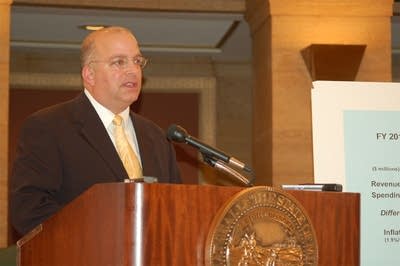Legislators eye fix for red ink
Go Deeper.
Create an account or log in to save stories.
Like this?
Thanks for liking this story! We have added it to a list of your favorite stories.

Minnesota's state budget deficit is projected to shrink to $4.57 billion over the next two-year cycle thanks to federal stimulus money.
Documents prepared by state finance officials show that without the federal aid, the deficit was projected to grow to $6.4 billion.

Federal stimulus dollars are also giving the state an actual surplus of $236 million for the current budget cycle that runs through June.
In December, state finance officials projected a $4.8 billion budget deficit. Unemployment is up, tax revenues are down, and Gov. Tim Pawlenty told a group of township officials last month that he was expecting the next forecast to show a deficit of up to $7 billion.
Turn Up Your Support
MPR News helps you turn down the noise and build shared understanding. Turn up your support for this public resource and keep trusted journalism accessible to all.
Rep. Loren Solberg, DFL-Grand Rapids, agreed.
"I don't think [an additional] $1.5 billion to $2 billion is an unreasonable estimate, based on the things that are happening in the economy," he said.
Solberg, who chairs the House Ways and Means Committee, said he thinks the forecast will also show a shortfall in the current budget. But he said Minnesota's federal stimulus money should fix that deficit, and prevent the governor from again using his emergency budget-balancing power.

Whatever the final number, Solberg said there's a massive task ahead to solve the deficit.
"It's going to take, I think, a cooperation and a swallowing of everybody's pride, everybody's political rhetoric in order to do what needs to be done in order to put our budget together," he said.
Democrats in the Minnesota Senate offer a similar assessment. Sen. Tom Bakk, DFL-Cook, chair of the Senate tax committee, said he wouldn't be surprised if the deficit exceeds $7 billion.
Bakk is already thinking about the framework of a budget solution. He said one-third should come from accounting shifts and the one-time federal stimulus money; another third from spending cuts, spread equally across all budget areas; and a final third from new revenue.

Gov. Pawlenty is firmly opposed to tax increases, but Bakk said he thinks there's a possibility to come up with some non-tax revenues, although he doesn't know what they are.
"That's the kind of balanced solution that I think will be painful. But I think the public and the business community will find a way, if not to be supportive, at least find a way to understand the challenge and the need to find a balanced approach for solving the deficit," Bakk said.
Pawlenty will to have to rework much of his budget plan to reflect the new forecast as well as the federal stimulus money. And DFL leaders have been waiting for the forecast to begin shaping their alternative budget.
But House and Senate Republicans say the pace of the session has simply been too slow, and they outlined their concerns during a Capitol news conference.
House Minority Leader Marty Seifert of Marshall said legislators could have been dealing with the deficit for the past two months.
"We're wondering right now where the priorities of the legislators are," Seifert said. "We should be focused like a laser beam on balancing the budget and working together in trying to come up with the solution. And so far, all of the ideas have come from the governor's office or the people behind me. And we have got absolutely nothing from the Democrats so far."
Democrats say the GOP complaint doesn't hold water. House Majority Leader Tony Sertich of Chisholm said the work of the session is actually a little ahead of schedule.
Sertich also said accurate financial information is needed before making budget decisions. And he said that information isn't available until the release of the new forecast.
(Tom Scheck contributed to this report.)



